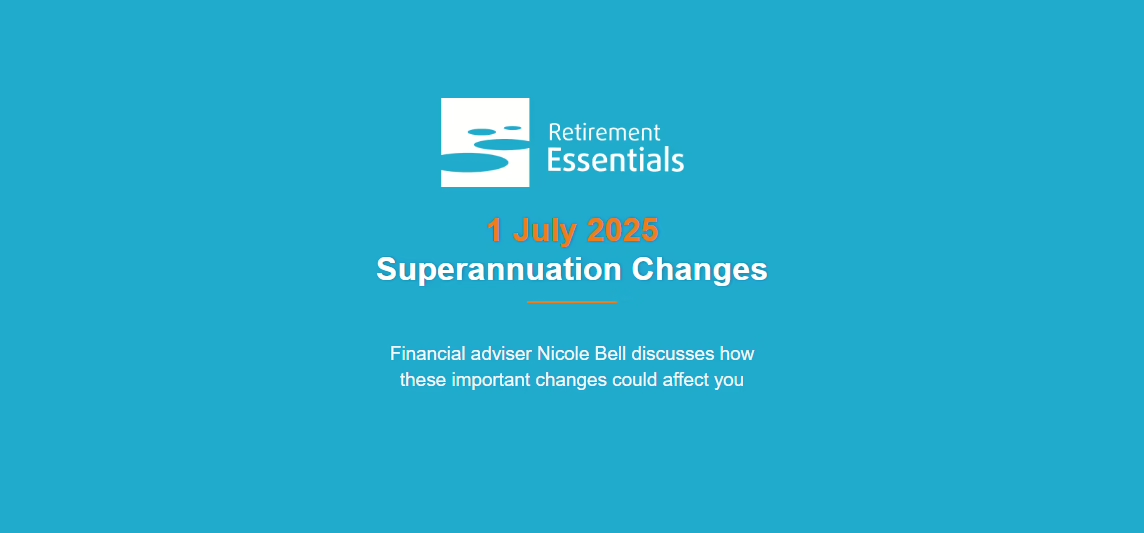
What’s the fuss?
There has been a huge amount of coverage – as well as some scams – on what might happen on 1 July. Today we update you on the facts so you can better understand if super changes are relevant and if, therefore, some action will be required.
First up, what is NOT happening is a special one-off payment for those on an Age Pension. Nothing whatsoever is scheduled, but there is a scam doing the rounds that suggests you need to click a link to be eligible for this ‘extra’ payment. It’s not legitimate – if there were any changes to the Age Pension, we would report on the nature of these changes as well as how you can access them.
Separately, what is planned to start on 1 July is a higher tax on individuals with total superannuation balances over a threshold of $3 million. Many commentators are suggesting that this is a widespread tax that is destructive to super savings, future generations, estate planning and venture capital investment. The goal of Retirement Essentials is always to keep you informed, as opposed to promoting strong opinions on the rules governing retirement income. Today’s article will explain the context of the changes, who will be affected and how and when the new rules will apply. We’ll leave it to you to be the best judge as to the value of this proposed change.
What are the changes?
Currently those with funds in super in accumulation (or savings) mode are taxed at a maximum of 15% on earnings, regardless of the amount, though the actual amount of tax paid is often less than this after franking credits are applied. The new rules will see an additional 15% tax applied to the proportion of fund earnings attributable to balances above $3 million. So it’s important to note that the first $3 million in accumulation will continue to be taxed at 15%.
One controversial aspect of this increase is that ‘unrealised gains’ will also be taxed. So if, for instance the value of your super rose significantly in a given financial year, if your balance exceeds $3 million, the additional tax would apply, even though you didn’t actually sell and ‘realise’ this earning. Importantly, in years where there are unrealised capital losses, these can be ‘carried forward’ and potentially applied to future gains. As all fund earnings are potentially captured by the proposed new tax, it is a good time to review your mix of assets and to do some numbers on the possible impact on your super.
Nicole Bell shares her thoughts

Who is most affected?
The new rules apply to balances higher than $3 million, which has been estimated to affect approximately 80,000 people, or less than 1% of all people with super accounts. Where the rules become controversial is that the amount of $3 million will not be indexed for inflation and wage increases. So in a few years’ time, it is likely this amount (of $3 million) will not be worth as much and there will be many more people who meet this threshold. So as the legislation has been written, the threshold will not move up over time. If it had been indexed to an inflation rate of, say, 2.5% it would be applied to those with around $5 million in 20 years’ time, not $3 million.
Is it actually law?
Not yet. The legislation will be (re)introduced to both Houses of Parliament after it is reconvened with a new government at the end of July. Whilst the Albanese Government has a strong majority in the Lower House, this is not the case in the Senate and it will need support from the Greens or cross-benchers to make this law. It is possible, at this stage, that changes to the intended legislation will need to be made, including the level of the cap or indexation or both.
What should you do?
As mentioned above, less than 1% of those with super accounts will be affected if these changes do become law and tax is applied from 1 July. For those with balances near or above $3 million you may wish to consider how this tax may affect you and options you may consider on how you structure your overall super and non-super savings. But this should be part of an overall retirement income strategy. Given the magnitude of money involved, it would be wise to consult with an experienced adviser before making any changes.
Super just got more complex
Even if you are not affected by these changes, with not one, but two different levels of taxation means calculations on future balances just got way more complicated. If you find it difficult to reconcile the rules on super, private savings and/or government entitlements, there is help at hand. Retirement Essentials offers 55-minute guided Retirement Advice Consultations with an experienced adviser who can step you through the options associated with your super, regardless of how much you have and if you are in savings or pension phase.
Were you aware of these changes?
Do you have any concerns about the aspects of taxing unrealised gains and indexation?
This article is provided by Retirement Essentials Representative Number: 001260855. We are an authorised representative of SuperEd Pty Ltd ABN 88 118 480 907 AFSL #468859. This information is not intended as financial product advice, legal advice or taxation advice. It does not take into account your personal situation, goals or needs and you should assess your own financial situation, consider if the information is suitable for you and ensure you read the relevant Product Disclosure Statement (PDS) if you choose to make any changes to your financial situation. It is always advisable to consult a financial adviser before making financial decisions.






You are promulgating Labor’s handy assumption that only 80,000 fund members will be affected. We all know that it is more than that but it suits the “fat cats” perception. If it were not for taxing unrealised gains which will result in double taxation when the assets are eventually sold, then sure, happy to pay more, even though most of us with higher balances already have! What about all the SMSF business owners holding their business premises in their SMSF where the value of the premises has increased beyond their control? Nothing has changed for them, except the political landscape.
Very close to tears ?
superannuation was never intended for the super wealthy to hoard excess wealth at 15% on earnings.
Relocate your funds in excess of $3M to alternative investment options and pay your fair share of tax.
No sympathy
What a great article without the hyperventilating and opinions, just the facts. How many have balances over $3mil, well that is a fact supplied by the public service not by a political party. Stop playing politics June and use facts to argue why the ultra rich should pay only 15% tax on earnings, oh that’s right it is indefensible .
Whilst I am not keen on tax on unrealised gains, the assumption that it is double taxed is a furfy, if it is taxed today it is exempt from tax tomorrow as it has already been paid, that’s basic accounting.
Please write about the fact that most people die with a lot of super still there. Then the massive discrimination kicks in. If you were ABLE to **choose** to marry, at some stage, perhaps even more than once, then you get a MASSIVE tax advantage. Because you can leave your super to an EX spouse, even if that spouse is not and never has been, financially dependent on you. (or to kids if you were ABLE to make that choice to breed and they meet the criteria for receiving the funds). But for those who did not have the CHOICE to marry, they are not even given that choice to use a massive tax break. For them, if they can’t get their super out of the account before they die (e.g., sudden death) then the TAX OFFICE gets 17% straight off the top. That applies even if the unmarried person has bequeathed their entire estate to charity. So the super system has been set up to financially reward you for getting married. Yet it is married people who cost the country BILLIONS when they get divorced, in lost productivity and court fees …oh…and Domestic Violence. Those who don’t incur all those costs on society…get NOTHING.
I consider that labour is attempting to bring back super to the original purpose for what it was set up for. That is provide an income for people who would otherwise have to rely on the age pension.
I’m sure the people who have assets and savings more the $3,000,000 would never need the pension or part pension for that matter.
No tears shed here.
There is nothing to stop future governments from indexing the amount.
What they are attempting is a starting point.
Super is supposed to be for your retirement hence the low tax rates, not for wealth creation. When you die and haven’t used the money the government rightly says society deserves the tax that wasn’t paid unless it goes to a dependant for their retirement.
Hi Team. Thanks for the clarification. Can I please ask for your confirmation that the only superannuation impacted are those in accumulation mode?
Hi Shane, from Head of Advice, David Kennedy: “The $3 million threshold for the purposes of the proposed Division 296 tax is calculated based on an individual’s Total Superannuation Balance (TSB) which includes any superannuation accumulation balances plus amounts held in retirement income streams.”
So in view of this I would assume that if your SMSF fund is affected by the new tax then the pension fund earnings on total super balances above $3 million will be taxed at 15% instead of zero as at present. Am I correct?
Hi William, many thanks for your question. Here’s a response from Head of Advice, David Kennedy: The proposed Division 296 tax is an additional tax based on a fund member’s Total Superannuation Balance (TSB) which includes all accumulation and pension accounts. Where the TSB exceeds $3 million, the proposed tax will apply on the proportion of earnings attributable to the balance above $3 million in a given financial year, adjusted for withdrawals and net contributions.
Once the proportion of earnings is calculated, the ATO will levy the additional tax at a rate of 15% and individuals will have the option to pay the tax via their super account or directly if they prefer. We hope this helps.
Very short on actual facts and examples.
Typical Retirement Essentilas, “entree” into a costly assesment of what most people should know, and can get for free via the Government money smart (etc) websites.
As the Tax office says: If you have over $3million in your super, you are earning about $380,000 per year. You ony pay an extra 15% on earnings from your super account that is OVER the $3million threshold.
So if you are lucky enough to have $2,900,000 in super you only pay the 15% on earnings that everyone with a super account pays.
But if you are even luckier and have $3,100,000 you will only pay 30% tax on the interest earned by the $100,000 that is over the $3million threshold.
Hi Jeff, thanks for your comment – here’s Head of Advice, David Kennedy’s thoughts on the proposed new rules: Many thanks for your comments. We’re seeing a lot of controversy surrounding the proposed Division 296 tax, and the odd misconception about the operation of the tax in different customer scenarios.
While the concept of an additional tax on a proportion of fund earnings for those with a Total Superannuation Balance (TSB) above $3 million is reasonably straightforward, the right strategic response and potential impact on those affected varies on a case by case basis depending on things like the nature of the assets held in super, liquidity levels in the fund, and the availability of effective tax free thresholds outside super which are relevant to weighing future ownership decisions.
A couple of things that pop up in customer conversations are the merits of reallocating capital between the super and non-super environment to optimise for net tax paid across different ownership structures; while those holding SMSFs with a high proportion of direct assets like commercial or residential property are more concerned about liquidity and meeting future tax obligations in financial years where they see a significant upward revaluation of those property assets. The proposed tax on unrealised gains in this scenario may be difficult to cover where a fund has a less liquid asset mix.
Some reader scenarios are simpler than others and many are comfortable to make decisions in a self-directed way. For those seeking help and guidance, we encourage choice by offering a range of options including hundreds of educational articles, free webinars, obligation-free 10-minute phone calls, and affordable advice consultations where people need more personalised advice and guidance and want to explore their own retirement planning scenarios and forecasts in more detail to better understand their options. We hope this is helpful.
You’re breaking my heart June ?
Superannuation was never intended for the super wealthy to hoard excess wealth at 15% on earnings.
Relocate your funds in excess of $3M to alternative investment options and pay your fair share of tax.
No sympathy
Super was never designed as either a low tax environment for properties or for large deposits. Considering ‘only’ 1.6 million can be converted to a pension account earnings on monies above that incur 15% earnings tax. For $3 million plus, 30% is still less than many PAYG earners have as their provisional rates. It’s a small but necessary change to super that will help pay for the services we all require. Perhaps it is time to look further at what is a very low, often zero tax environment.
You stated above: “While the concept of an additional tax on a proportion of fund earnings for those with a Total Superannuation Balance (TSB) above $3 million is reasonably straightforward….”. The key word is “proportion”. The best explanation I’ve seen was in last weekend’s Herald Sun when I was in Melbourne, and I quote: “…say a super fund member has a $3m balance as at 1 July 2025 and by 30 June 2026 the balance increases to $3.2m super balance. Division 296 taxes the proportion of earnings above $3m, so in this example, $200,000 represents 6.25% of the $3.2m super balance. As such, only 6.25% of the increase in value above $3m is taxable at the additional 15%. The tax paid is not what some people assume, that is,15% on $200,000 being $30,000. Instead, it is 6.25% of the $200,000 taxed at 15% which equals $1875. As a percentage, the Division 296 tax payable represents just 0.94%. That’s a far cry from 15% tax….”
Oh, and the article went on to state, and I quote: “….In other words, if your super fund is slightly over $3m you will not really feel a big impact from Division 296 tax. You need quite a bit more in super to really feel the sting…”
The top 100 SMSFs had $13.1 billion combined. If that whole amount was taxed at 15% it is almost $2 billion.
In 2020 ATO said there were 600 SMSF with $20 million and most funds have 2 members so 1200 people with over $10 million and if they made 10%, a bit over a million the division 296 tax is only 73% of the 15%, so a bit over $100k.
Kerry Packer has been oft quoted about tax, telling the government that if they didn’t like people using the system to their advantage then the system should be changed. I think that is what they are now doing.
People with enormous balances have had it good for a long time.